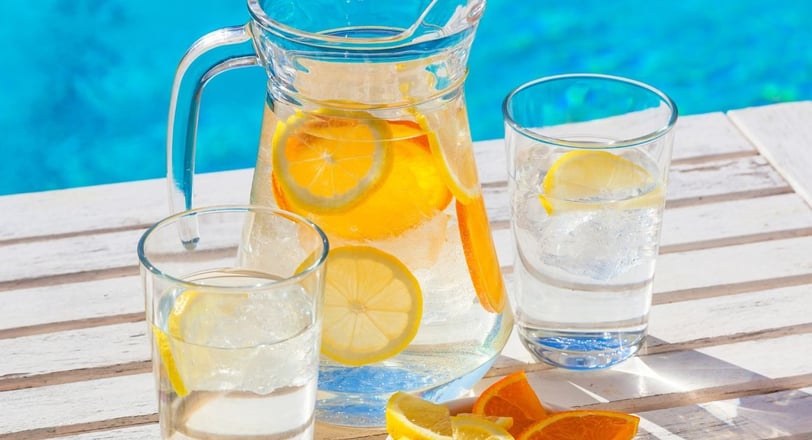The Power of Hydration: How to Maintain Optimal Water Intake Daily
Have you ever wondered how something as simple as water can profoundly impact your health? Whether you're a student, a professional, or enjoying your golden years, staying hydrated is essential for maintaining energy, clarity, and overall wellness. This article dives into the importance of hydration and practical tips to keep your body fueled for all stages of life.


Why Hydration Matters
Water is the foundation of life. It makes up approximately 60% of your body weight and plays a vital role in nearly every bodily function. From regulating temperature to transporting nutrients, hydration is crucial for physical and mental performance. Neglecting your water intake can lead to dehydration, which may cause fatigue, headaches, and even long-term health issues.
Benefits of Proper Hydration:
Boosts Physical Performance: Staying hydrated ensures that your muscles and joints function optimally, reducing fatigue and risk of injury.
Enhances Cognitive Function: Proper hydration improves focus, memory, and mood.
Aids Digestion: Water helps break down food and prevent constipation.
Supports Kidney Health: Adequate water intake flushes toxins from your body.
Promotes Healthy Skin: Hydrated skin appears plumper and more radiant.
Daily Water Needs: How Much Is Enough?
General Guidelines:
The "8x8 rule" (eight 8-ounce glasses per day) is a good starting point, but water needs vary based on age, weight, activity level, and climate. Here are some personalized tips:
Adults: Aim for 2.7 liters (91 ounces) for women and 3.7 liters (125 ounces) for men daily, including water from food and beverages.
Children: Depending on age, children need between 1 and 2 liters (34-68 ounces) daily.
Older Adults: Hydration becomes even more critical as aging can diminish thirst cues. Ensure consistent water intake.
Adjusting for Activity and Environment:
During exercise, drink an additional 0.5 to 1 liter (17-34 ounces) for every hour of physical activity.
In hot or dry climates, increase your intake to compensate for sweat and evaporation.
Recognizing Dehydration: Signs to Watch For
Dehydration can sneak up on you. Early symptoms include:
Thirst
Dark yellow urine
Dry mouth and lips
Fatigue or dizziness
Decreased urine output
Severe dehydration, which requires medical attention, can cause rapid heartbeat, confusion, or fainting.
Quick Tip: Monitor your urine color. Pale yellow indicates good hydration, while dark yellow or amber suggests you need more water.
Creative Ways to Stay Hydrated
If plain water doesn’t excite you, there are plenty of ways to boost your intake:
Infused Water Recipes:
Citrus Splash: Add slices of lemon, lime, and orange to a pitcher of water for a refreshing twist.
Berry Bliss: Combine strawberries, blueberries, and mint leaves for a naturally sweet flavor.
Cucumber Cooler: Pair cucumber slices with a hint of basil or mint for a spa-like experience.
Water-Rich Foods:
Fruits: Watermelon, oranges, and strawberries are over 90% water.
Vegetables: Cucumbers, lettuce, and zucchini provide hydration and nutrients.
Apps and Gadgets:
Consider using hydration-tracking apps or smart water bottles that remind you to sip throughout the day.
Common Hydration Myths Debunked
Myth 1: You Need to Drink 2 Liters Every Day
Truth: While 2 liters is a general guideline, individual needs vary. Listen to your body and adjust accordingly.
Myth 2: Caffeinated Drinks Dehydrate You
Truth: Moderate caffeine consumption contributes to daily water intake and doesn’t significantly dehydrate you.
Myth 3: You Can Only Hydrate with Water
Truth: Herbal teas, milk, and even soups count toward your fluid intake.
FAQs About Hydration
Q: Can I drink too much water? A: Yes, overhydration (hyponatremia) can dilute essential electrolytes. Stick to balanced hydration and avoid excessive intake in a short time.
Q: Does drinking water improve weight loss? A: While not a magic solution, drinking water before meals can reduce calorie intake by promoting fullness.
Q: What’s the best time to drink water? A: Sip throughout the day. Start with a glass upon waking, drink before meals, and hydrate before and after exercise.
Conclusion
Staying hydrated is one of the simplest yet most effective ways to support your health and well-being. By incorporating more water into your daily routine, you can enjoy increased energy, improved focus, and better overall health. Share this article with friends and family to spread the message of hydration’s importance.
Products Reviews
Disclaimer
The statements on this website have not been evaluated by the Food and Drug Administration. The articles and products advertised are not intended to diagnose, treat, cure, or prevent any disease.
The content of the website and the products advertised are based on the opinions of the authors and are provided solely on an "AS IS" and "AS AVAILABLE" basis. You should do your own research and confirm information with other sources when seeking information about health issues, and always carefully review the information with your healthcare professional before using any of the protocols presented on this website and/or the products indicated. Neither Drops&Pills nor the authors are engaged in rendering medical or similar professional services or advice through this website or the products, and the information provided is not intended to replace medical advice offered by a physician or other licensed healthcare professional. You should not construe the recommendation of the products by Drops&Pills as an endorsement by Drops&Pills of the opinions expressed herein, or any guarantee of any strategy, recommendation, treatment, action, or application of advice made by the authors of the products.
Some names and personally identifiable information on this site have been changed to protect the privacy of individuals.
Drops&Pills is the publisher of the articles on this site. Drops&Pills' role as publisher does not constitute an endorsement, approval or review of the products advertised herein or any claim, statement or opinion used in the promotion of those products.
For product support, please contact the suppliers.
For purchase and order support, please contact the platform you placed the order through.
For support with article information, please contact Drops&Pills here.
*Free shipping according to the rules on the product page.
Natural Products for Better Health
© Drops&Pills Research 2025 All rights reserved
Contacts
contact@dropsandpills.com
